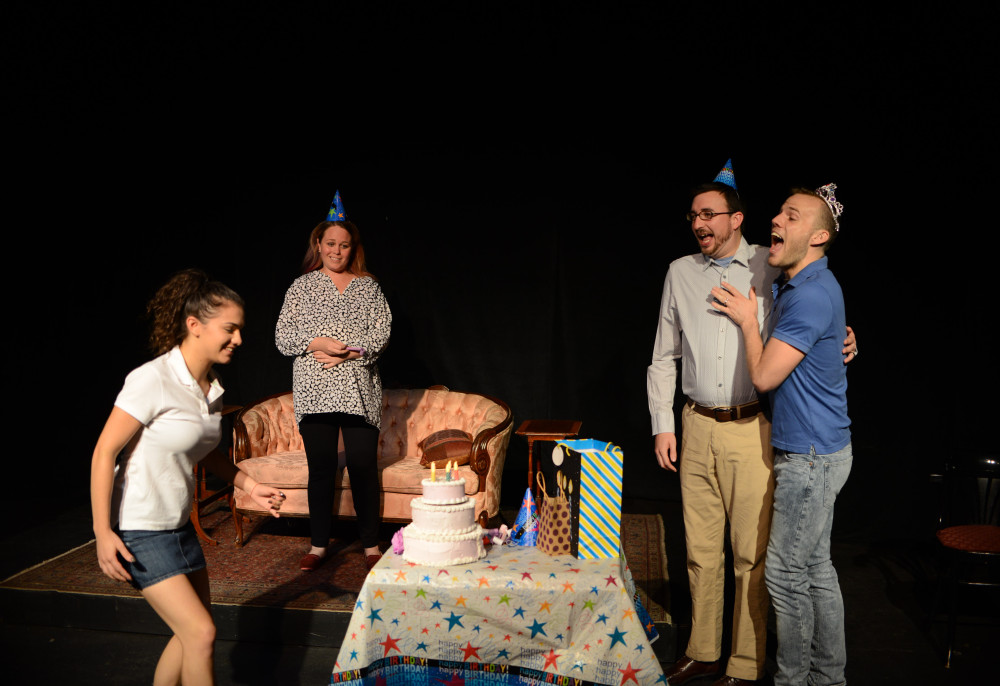
The second play in Quince Productions’ annual GayFest ,is HARBOR by Tony-nominee Chad Beguelin. Single mom Donna (Jessica Snow), has been dragging her intelligent yet lonely teenage daughter, Lottie (Rachel Berkman), cross-country. Along the way they stop in the Hamptons to barge in upon Donna’s brother and brother-in-law, Kevin (Michael E. Manley) and Ted (Andy Shaw). Staying the night turns into staying almost nine months, and the presence of his once-estranged sister completely upends Kevin’s ideas of happiness and family. This comical tragedy shows what happens when the need to be nurtured, and the urge to nurture another, intertwine.
As Donnie and Lottie approach their unwitting hosts, Lottie reads Edith Wharton’s The House of Mirth, a story of an impoverished socialite with an addiction trying, yet failing, to climb back up the social ladder. Kevin and Ted’s house certainly meets the Hampton’s reputation for style and excess, and when they arrive, Donna weeps “Their house looks like a wedding cake… They live in a wedding cake and we live in a van!” Inside, Kevin seems to have it all – a beautiful house, a respectable circle of friends, and a wealthy architect husband who supports him and his half-baked dream of being a writer. This “homo American dream” mini-mansion would be perfect, in Donna’s mind, to raise a child. Even though Ted abhors both children and their parents, the hypothetical soon becomes a possibility. The news of a baby on the way then begins to tear apart the couple’s hopes for their lives.
Beguelin’s script expertly navigates between comedy and tragedy, and is scathingly witty. Sometimes, however, it can be a bit too witty as some bits of dialogue certainly leave better impressions on paper than when spoken aloud – nothing egregiously clunky, but a few metaphors can be too contrived. Closer to the end of the show, Ted makes an incredibly erratic financial decision in contradiction to his complaints at the financial duress he and his firm are under. Fortunately, his characters’ relationships to each other make us as an audience believe almost every moment, and the characters’ torments can be, at times, visceral and moving. Rachel Berkman, HARBOR’s youngest ensemble member, deserves a nod for Lottie’s scene in which she makes a very special phone call to her birth father.
All under the helm of director Rich Rubin, HARBOR is ultimately a touching, discomfiting night at the theatre. He also is producing artistic director of Quince Productions, which puts up GayFest every year. GayFest annually showcases LGBT-themed plays, proving it’s human stories, not the budget or capital resources, that make good theatre. (Christopher Haddad’s set comprises merely of some furniture and a raised platform on which an antique couch rests. It leaves room for the story to breathe, as other productions with realistic sets may not even necessarily benefit from the high production value.)
By the end of the play, Donna asks Lottie what happens at the end of House of Mirth. Lottie lies, saying the protagonist gets married and lives happily ever after (in actuality, House of Mirth’s protagonist Lily dies of a choral hydrate overdose). This moment is HARBOR in a thematic nutshell – a child who must become an adult, and an adult trying to escape her childhood.
[Studio X, 1340 S 13th St] August 14-26, 2016; quinceproductions.com.
